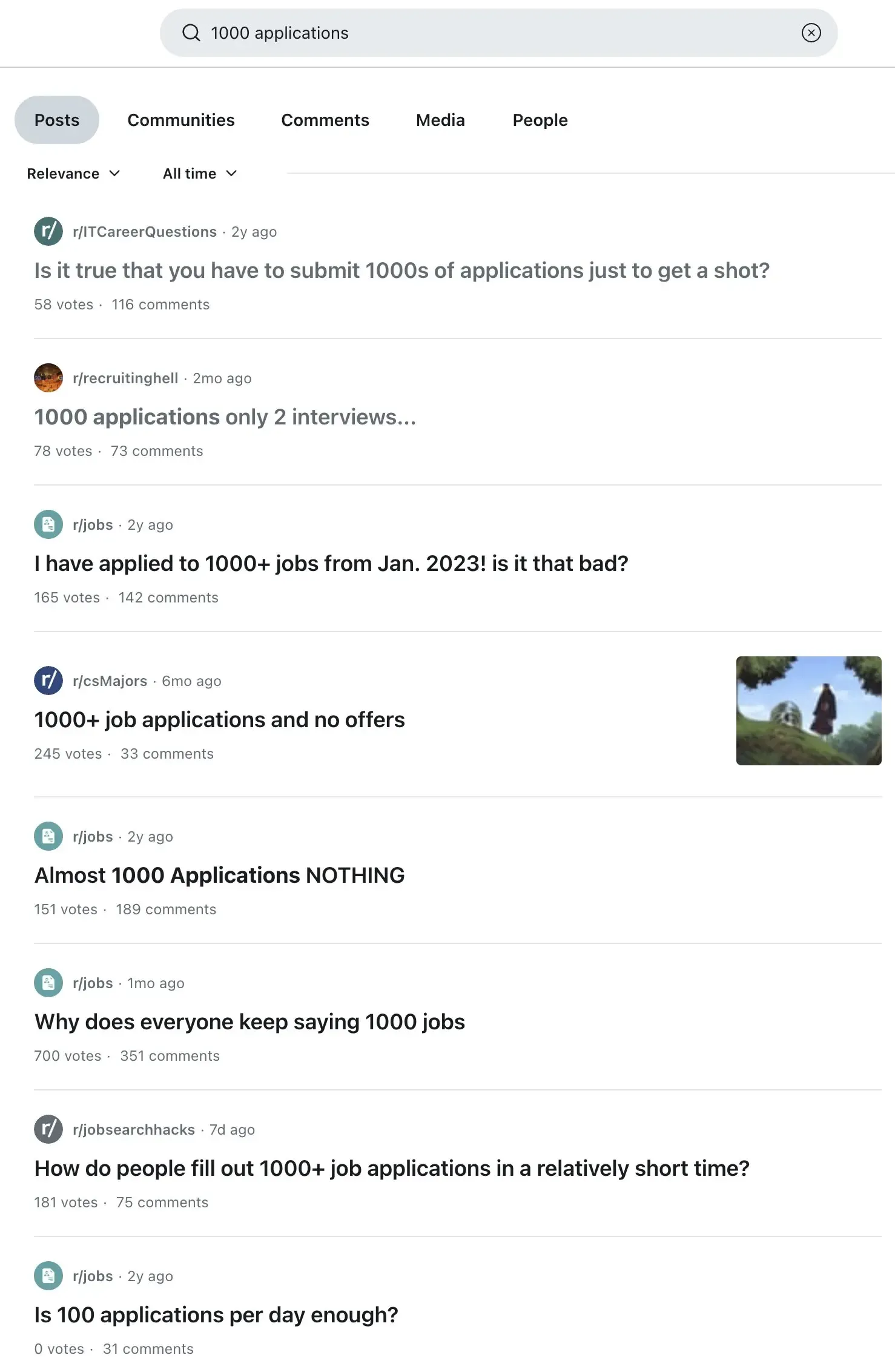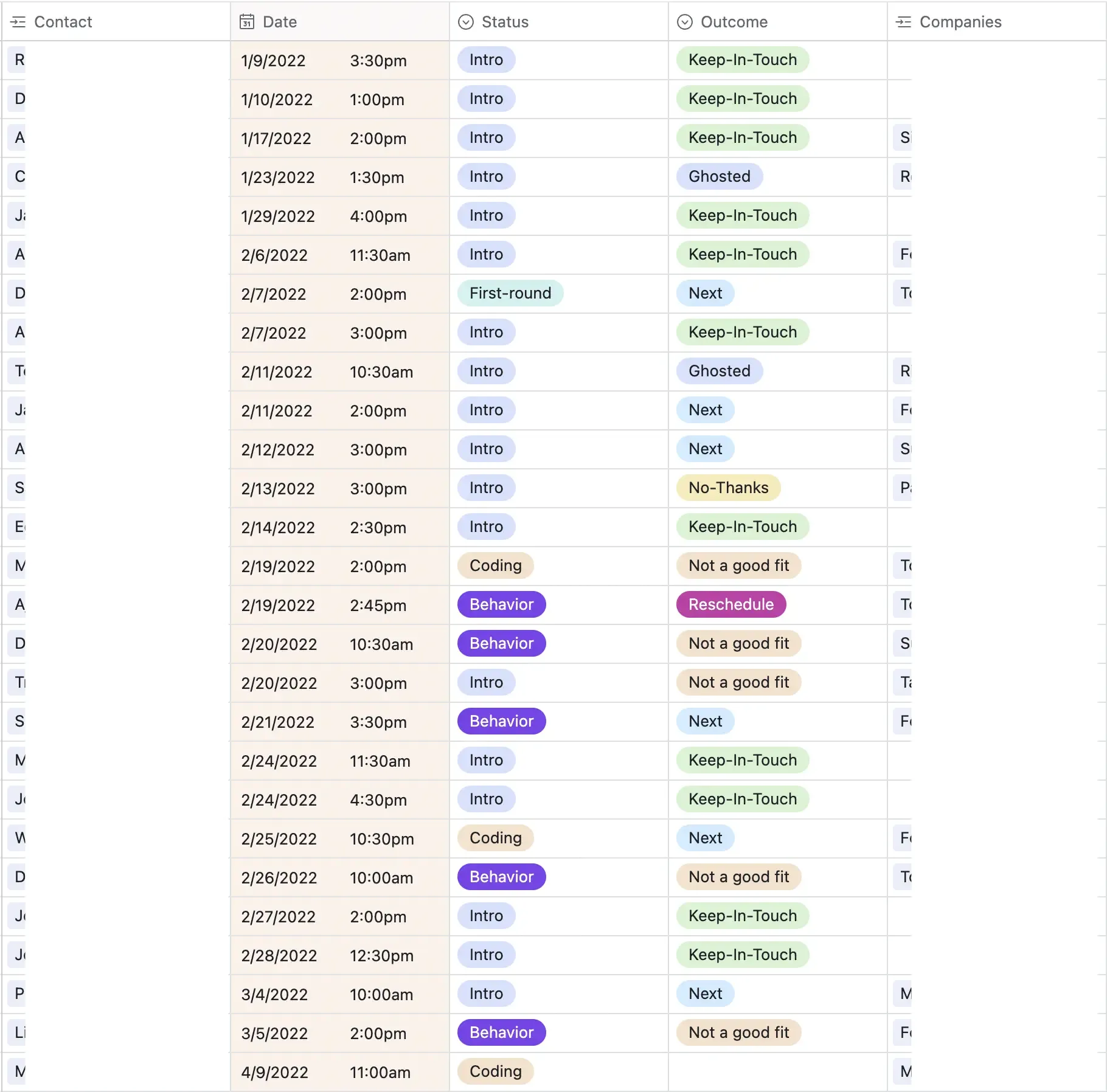
The 1000-Application Reality: Why Tech Interviews Are Broken
Search “1000 applications” on Reddit and you’ll see it’s not hyperbole anymore—it’s the new normal:

“Is it true that you have to submit 1000s of applications just to get a shot?” Yes. Yes it is.
From “1000 applications only 2 interviews” to “Almost 1000 Applications NOTHING”—these aren’t outliers. They’re becoming the standard experience for tech job seekers in 2025.
The tech interview process isn’t just difficult—it’s fundamentally broken. And we’re all pretending our “advanced” tracking systems are enough to manage the chaos.
The Numbers Are Real
Looking at those Reddit posts, the patterns are undeniable:
- “1000+ job applications and no offers” (245 upvotes - this resonated)
- “Is 100 applications per day enough?” (The fact this is a real question…)
- Multiple interviews per day becoming standard
- Months of sustained effort for a single offer
The sheer scale has shifted. What used to be “send 50 applications” is now “send 1000.” What used to be “manage 3-4 interviews” is now “juggle 15-20 active processes.”
This isn’t a skills problem. This is a process problem.
The Hidden Chaos Nobody Talks About
Sure, we all joke about “the grind,” but let’s get real about what managing a modern job search actually looks like:
The “Organized” Chaos
Everyone thinks they have the solution. “Just use Airtable!” they say. “It’s better than a spreadsheet!”
Is it though?
Calendar Tetris
Your calendar becomes a nightmare. Imagine 25+ interviews scattered across your Google Calendar. “Intro” at 2pm. Another “Intro” at 3:30pm. “Behavioral” at 10am tomorrow. Which company? What role? Who’s the interviewer?
You’re playing calendar Tetris while trying to prep for completely different types of interviews. The 2pm might be a startup wanting entrepreneurial stories, while the 3:30pm is an enterprise company looking for process-oriented examples.
The Amnesia Effect
Multiple interviews with one company, two with another, scattered “Intro” calls everywhere. By week 4, every company blurs together:
- “Which company was I talking to about React?”
- “Did I already tell this person about my distributed systems project?”
- “Wait, is this the fintech or the edtech company?”
You know it’s bad when you need a spreadsheet just to remember what you told whom. One person commented: “I started color-coding my stories by company. Still mixed them up.”
The Emotional Toll We Don’t Discuss
Beyond the logistics, there’s the mental load. Every day you’re:
- Context-switching between different company cultures
- Maintaining enthusiasm for your 15th “Why do you want to work here?” answer
- Dealing with rejection while preparing for the next interview
- Second-guessing every interaction
The cognitive overhead is exhausting. You’re not just looking for a job—you’re running a complex project management operation with your career on the line.
Why “Just Use Calendar/Notion/Trello” Doesn’t Cut It
I’ve seen every solution in those forum threads:
“Just use Google Calendar!”
- Great, now I have events with no context
- Which round is this? Who’s my interviewer? What’s the job title again?
- Zero connection to my application status or notes
“I built a Notion database!”
- Congrats on your second full-time job
- Still manually copying everything
- Good luck accessing it quickly during an interview
“Trello works for me!”
- Cards everywhere but no calendar integration
- Dragging cards while your interview starts in 2 minutes
- The mobile experience… enough said

This is what “organized” looks like. 25+ interviews, multiple stages, various outcomes. Good luck remembering which “Intro” call is which.
Look at that screenshot. That’s someone’s actual interview tracker—25+ rows of interviews, behavioral rounds, coding assessments, all blending together. Some are marked “Keep-In-Touch” (whatever that means in week 8), others “Ghosted,” and a concerning number say “Not a good fit.”
The worst part? This is the organized version. This person took time to set up a proper system, and it’s still overwhelming.
The truth? These tools weren’t built for this use case. You’re forcing project management tools to handle a deeply personal, high-stakes, time-sensitive process.
The System Is Broken, But Your Approach Doesn’t Have To Be
Here’s what’s maddening: everyone knows this is broken. Recruiters know it. Hiring managers know it. Candidates definitely know it. Yet we’re all stuck in this system, pretending a spreadsheet and calendar are enough.
But what if they’re not? What if the chaos isn’t inevitable?
What if you could:
- See all your interviews across every company in one place
- Never lose track of which round you’re in or who you’re meeting
- Have your notes and feedback connected to the right opportunity
- Actually feel in control of your journey
The Journey Ahead
The tech interview process is an odyssey—long, challenging, and full of obstacles. But every odyssey needs a good navigator.
Next week, I’ll share why the current “solutions” are just band-aids on a broken system, and what a real solution might look like.
For now, I want to hear from you: What’s your biggest interview management nightmare? Drop a comment below or join the conversation on Twitter.
Because if we’re going to fix this mess, we need to fix it together.
Ready to navigate your interviews like a pro? Join the Odysi beta waitlist and be among the first to experience systematic interview management.
We’re building something better. Join 2,000+ professionals who are already transforming their job search strategy.
Ready to eliminate interview admin overhead?
Join the beta and get lifetime free access
Limited spots • No credit card required